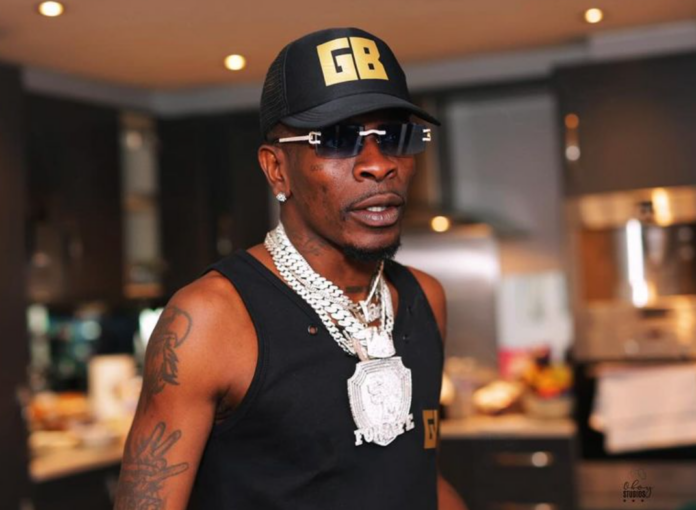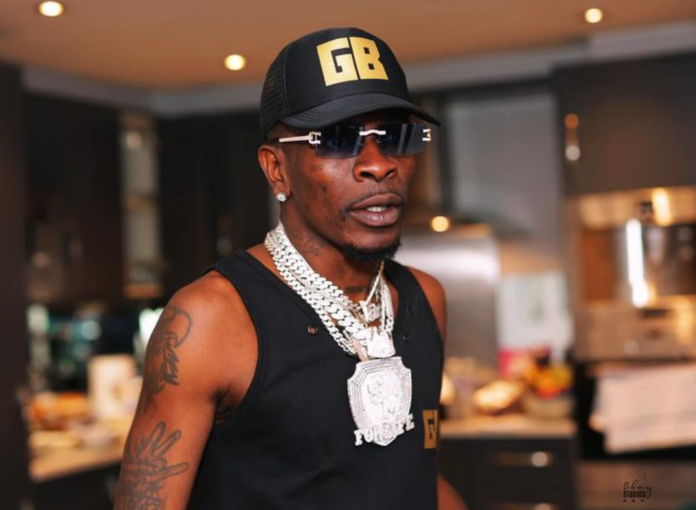
Entertainment pundit Sallyman has argued that Shatta Wale’s prolonged rift with the Telecel Ghana Music Awards has significantly limited his artistic growth and damaged his competitive standing in the dancehall genre.
According to the analyst, the dancehall star’s absence from Ghana’s most prestigious music awards scheme has prevented him from achieving the international recognition his talent deserves, allowing rival Stonebwoy to dominate the category with ten consecutive Reggae/Dancehall Artiste of the Year wins.
“It is one of the things that has shattered the dreams of Shatta Wale as an artiste,” Sallyman stated during a recent entertainment industry discussion. “If the biggest award show in your country does not recognize you to the point that one artiste has won it nine times, it makes you weak as an artiste.”
Her assessment comes as Stonebwoy recently secured his tenth Reggae/Dancehall Artiste of the Year award at the 2025 TGMA, extending his unbroken streak in the category. The Bhim Nation leader has won the award in 2015, 2016, 2017, 2018, 2019, 2022, 2023, 2024, and 2025, establishing himself as the most decorated artiste in that category.
Sallyman believes that Shatta Wale’s dominance in Ghana’s music space, particularly his ability to draw massive crowds, should have translated into continental and global influence. However, his voluntary exclusion from the country’s premier awards platform has created a perception problem that undermines his status.
“But for his absence in the awards schemes, Shatta Wale’s dominance in the music space would have transcended the borders of Ghana,” she argued, suggesting that TGMA recognition serves as a crucial validator for international audiences and industry stakeholders.
The pundit noted that in dancehall circles, Stonebwoy’s consistent accumulation of major awards has positioned him as the genre’s dominant figure, creating a narrative that Shatta Wale finds himself comparatively weaker despite his commercial success and fan base.
Sallyman believes returning to the TGMA would help Shatta Wale realize his unfulfilled dreams and reclaim competitive ground in the genre he helped popularize in Ghana. “Coming back to the scheme will do Shatta Wale more good and will help him realize his dreams,” she stated.
The backstory to this situation traces back to the controversial 2019 Vodafone Ghana Music Awards, when an onstage altercation between Shatta Wale and Stonebwoy disrupted the ceremony. The confrontation led Charterhouse, the scheme’s organizers, to indefinitely ban both artistes and annul the Artiste of the Year and Most Popular Song of the Year categories that night.
While the ban was officially lifted in January 2021, Shatta Wale has chosen not to participate in subsequent editions. He announced on Facebook in May 2019 that he would no longer be part of the TGMA, and has maintained that position despite recent overtures from the organizers.
The SM Boss’s absence has been conspicuous, particularly during years when his commercial performance and cultural impact appeared to merit recognition. His ShattaFest 2025 concert at Independence Square in October drew over 300,000 fans according to estimates, demonstrating his unmatched ability to mobilize audiences.
Despite not participating in TGMA, Shatta Wale has achieved significant milestones. He collaborated with Beyoncé on “Already” from The Lion King: The Gift album, earned a Grammy nomination, and won Best Virtual Entertainer of the Year at the 2021 International Reggae and World Music Awards.
However, Sallyman’s argument centers on the symbolic importance of home country validation. She suggests that in the music industry, consistent recognition from one’s national awards platform signals staying power and relevance that international audiences pay attention to.
Recent developments suggest potential thawing in the relationship. Following the successful ShattaFest 2025 event, Shatta Wale’s management delegation visited Charterhouse to express gratitude, as the events company produced the concert. During that meeting, former TGMA Public Relations Officer George Quaye proposed creating a special honorary category for established artistes like Shatta Wale.
Quaye argued that placing veteran artistes in competitive categories alongside emerging talents creates uncomfortable dynamics. He suggested a non competitive recognition similar to the Lifetime Achievement Award, which would honor career contributions without requiring direct competition.
Theresah Ayoade, Chief Executive Officer of Charterhouse, indicated willingness to present the proposal to the TGMA board, noting that the scheme has evolved considerably over its 26 year history. Additionally, Charterhouse has announced plans to partner with Shaxi, Shatta Wale’s ride hailing company, for future TGMA editions.
These developments have fueled speculation about Shatta Wale’s potential return to the awards scheme. His manager Sammy Flex previously expressed hope that the artiste would attend, though he clarified that the final decision rests with Shatta Wale himself.
Sallyman’s commentary reflects broader industry discussions about how personal conflicts and institutional relationships can impact artistic legacies. While Shatta Wale remains commercially successful and culturally influential, his TGMA absence has created a narrative vacuum that Stonebwoy has filled with consistent recognition.
The pundit’s analysis raises questions about the relationship between awards validation and artistic growth. Can an artiste achieve full continental recognition without the backing of their home country’s premier awards platform? Or does commercial success and fan loyalty ultimately matter more than institutional recognition?
For Stonebwoy, his decade long TGMA dominance in the Reggae/Dancehall category has complemented his international collaborations, tours, and streaming success. He won Artiste of the Year in 2015 and 2024, signed with Def Jam Recordings, and maintains a consistent presence on international stages.
Meanwhile, Shatta Wale’s path has been equally impressive in different ways. His ability to independently build a massive following, create viral moments, and maintain cultural relevance without awards validation demonstrates an alternative model of success.
However, Sallyman insists that the absence of TGMA recognition has cost Shatta Wale opportunities for growth that cannot be measured purely in commercial terms. The validation that comes from competing and winning at home, she argues, opens doors internationally that remain harder to access without it.
Whether Shatta Wale will heed this advice and return to TGMA remains uncertain. The artiste has built his brand partly on independence and defiance of industry conventions, making a return potentially complicated from both practical and symbolic perspectives.
As the Ghanaian music industry continues evolving, the Shatta Wale and TGMA saga represents an ongoing conversation about the value of institutional recognition versus independent success, and whether artistes can truly achieve their full potential without engaging with their home country’s established validation mechanisms.
